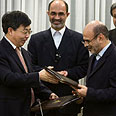
Report: China curbs Iran energy work
Beijing slows down Iran gas investments as US officials puts on the pressure but Tehran fights back saying: Make progress or lose projects
The stakes are high for OPEC's second-largest producer, as China is one of the only powers on the international political stage capable of providing the billions of dollars of investment Tehran needs to maintain the capacity of its strategic oil sector.
Related stories:
- China, Iran ink major infrastructure, trade deals
- IAEA reaffirms concern over Iran nuke program
- Report: N. Korea supplied nuclear software to Iran
Four energy executives in Beijing described retreats and slowdowns of Chinese ventures in Iran in recent months, even as China has bought more crude from its Middle East partner, which leans on Beijing for backing and investment to counter sanctions over its disputed nuclear plans.
Being cooperative
The slowing of China's energy investments in Iran was prompted, at least partly, by Beijing's efforts since late 2010 to ease tension with the Obama administration and cut the risk of Chinese oil firms being hit by US sanctions that Congress has vigorously backed, said officials.
President Barack Obama and key members of his cabinet have pressed Beijing to do more to help rein in Iran's nuclear activities, and Vice President Joe Biden raised the issue during his recent visit to China, White House spokeswoman Caitlin Hayden told Reuters.

Under pressure: Drilling stopped (Photo: AP)
Obama, Biden and Secretary of State Hillary Clinton "all have stressed the need for continued Chinese restraint in investing in Iran's energy sector, by slowing down existing activities and by not concluding any new deals," said Hayden.
US officials have literally come knocking at the doors of Chinese energy executives, one of the executives said.
"The Chinese are quietly taking credit with US officials for being cooperative" on Iran, a senior US Congressional aide who closely follows US-China relations told Reuters.
Tehran has noticed and has warned Chinese firms they need to make progress on energy projects. US pressure appears to have compounded commercial tension over the terms of Chinese energy investments in Iran, and those strains have grown this year.
There are no signs China will risk rupturing its relationship with Tehran, but ties could become testier and harder to manage.
Beijing has worked to ensure United Nations sanctions on Iran do not imperil its energy investments and oil and gas purchases. But unilateral US sanctions could be invoked to punish Chinese firms with operations in the United States for their work in Iran. The Obama administration has avoided taking that step, mindful that such a move is likely to anger Beijing.
Double warning for CNPC
Since June, CNPC, China's biggest state oil and gas group, was twice warned by its Iranian counterpart to speed up work at the giant South Pars natural gas field or risk losing the multi-billion-dollar deal, Iranian media reported.
CNPC has delayed drilling exploration wells since it signed a $4.7 billion deal to develop phase 11 of South Pars in 2010.
The warnings to CNPC came after China's third largest energy firm CNOOC pulled its team from Iran's North Pars gas venture, two Chinese executives said. In late 2010, CNOOC was told by the Chinese government to stop work at the project, one said. The Chinese industry officials all spoke on condition of anonymity.
China's second-largest oil and gas firm Sinopec Group, which Beijing-based oil sources said has done more work on the ground than the other two, has delayed the start date of the $2 billion Yadavaran oil development.
Many US lawmakers believe Beijing has not done enough to curtail ties with Iran. New legislation could increase pressure on the Obama administration to punish Chinese energy firms, said Mark Dubowitz, executive director of the Foundation for Defense of Democracies, a Washington DC-based institute that favours stronger sanctions against Iran.
Moving into an election year, he said: "The administration will not want to be seen to be weak on this issue."
- Follow Ynetnews on Facebook
- Receive Ynetnews updates directly to your desktop










